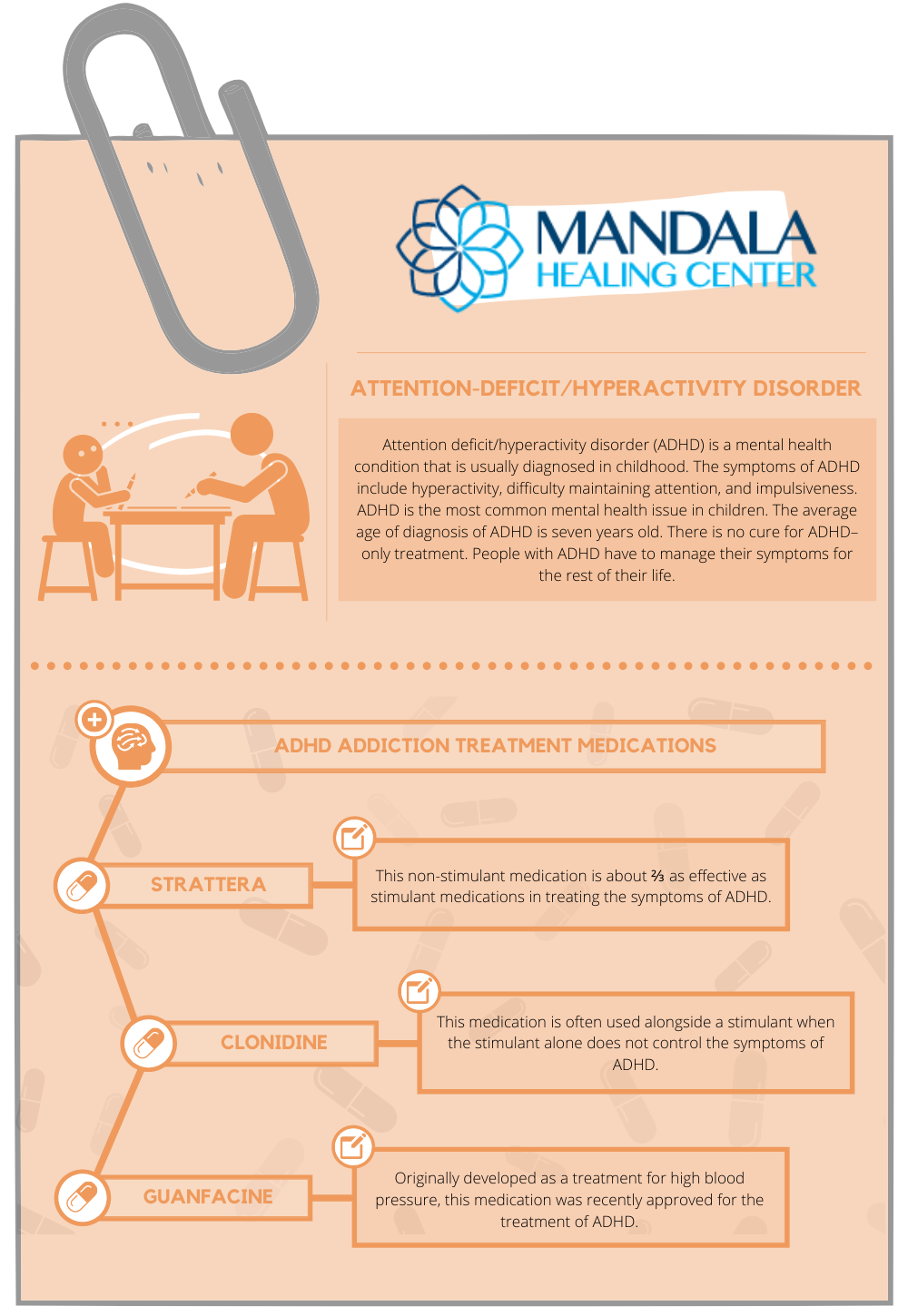Attention deficit/hyperactivity disorder (ADHD) is a mental health condition that is usually diagnosed in childhood. The symptoms of ADHD include hyperactivity, difficulty maintaining attention, and impulsiveness. ADHD is the most common mental health issue in children. The average age of diagnosis of ADHD is seven years old.[1] There is no cure for ADHD–only treatment. People with ADHD have to manage their symptoms for the rest of their life.
For many people, living with ADHD presents challenges in daily functioning. While ADHD is fairly common, there is still much to be learned about how the condition affects people’s lives, including their health. Substance abuse and addiction are common among people with a diagnosis of ADHD. People who have ADHD may be more likely to initiate drug and alcohol use, and the medications that are used to treat the condition have the potential to be abused. For those living with ADHD and substance abuse, it is important to explore the link between the conditions so individuals can be proactive about getting the help they need.
About 11 million adults living in the United States have a diagnosis of ADHD, and some of them struggle with addiction and substance abuse.[2] It is important to continue to learn more about this condition so that people living with it can receive the best treatment for ADHD and addiction possible.
Exploring the Connection Between ADHD and Addiction
There is no evidence that ADHD causes addiction or that addiction leads to ADHD. Instead, there is a clear link between the two conditions and theories about why they may be connected.
What we do know is that people who get treated for addiction are five to ten times more likely to have a diagnosis of ADHD than the general population. People who have ADHD are more likely to drink heavily than their peers and begin to drink earlier than their peers.[3]
It is thought that the decreased impulse control and impulsivity that define ADHD may lead people to experiment with substances and continue to use them despite negative consequences.
ADHD and Substance Abuse: Abusing ADHD Medications
Most of the medications prescribed to treat ADHD are stimulants. The symptoms of ADHD, including impulsivity and hyperactivity, are thought to be caused by a lack of stimulation in the central nervous system (CNS). Taking stimulants provides the CNS with the increased activity it needs, and people’s symptoms are more manageable.[4]
Because they are stimulants, ADHD medications have the potential to be abused. Some people who do not have ADHD may take these medications for their stimulant effects. Drugs like Ritalin, Adderall, and Vyvanse are taken recreationally by people who do not have a prescription for them. Taking these stimulant medications poses a serious risk of abuse and addiction.
Generally, people with ADHD do not become addicted to their prescribed medications if they take them under medical supervision. There is some debate about whether it is a good idea to give people with poor impulse control addictive medications.
Medications Used in The Treatment of ADHD and Addiction
In recent years, several non-stimulant medications have been approved for use in treating ADHD. These medications can be a safer option to use when treating people who struggle with ADHD and substance abuse. These include:[5]
- Strattera: This non-stimulant medication is about ⅔ as effective as stimulant medications in treating the symptoms of ADHD.
- Clonidine: This medication is often used alongside a stimulant when the stimulant alone does not control the symptoms of ADHD.
- Guanfacine: Originally developed as a treatment for high blood pressure, this medication was recently approved for the treatment of ADHD.
These non-stimulant ADHD medications can be used alone or in combination with stimulant medications to treat the symptoms of this condition. Since they are not stimulants, they are not controlled substances. For some people diagnosed with ADHD and substance abuse, these non-stimulant medications offer an alternative method of treating their symptoms with less potential for abuse.
Dual Diagnosis Substance Abuse Treatment for ADHD
When someone has a dual diagnosis–a mental illness and a substance use disorder that exist at the same time–it is important to treat both conditions at the same time. This is true when someone has both ADHD and addiction.
Treatment programs for ADHD and substance use disorder involve a combination of therapeutic activities, including:
- Group support meetings
- Individual therapy
- Education about ADHD and addiction
- Recreation
- Holistic treatments such as exercise, meditation, art, or music therapy
- Skill-building groups
- Nutrition therapy
- Lifestyle counseling
- Medication management
Treatment for ADHD and substance abuse can happen in a variety of settings and at several different levels of care. Each person will receive a tailored program designed to meet their needs and help them achieve their own goals.
Find Treatment for ADHD and Addiction Today
If you or someone you love requires addiction treatment and has a diagnosis of ADHD, please reach out to the staff at the Mandala Healing Center for information about the programs we offer.
Don’t wait another day for the care you deserve. Take the first step towards life-changing treatment. Call now to speak with one of our admissions counselors and see if our dual diagnosis addiction treatment program in West Palm Beach is right for you.
References:
- https://www.cdc.gov/ncbddd/adhd/diagnosis.html
- https://www.nimh.nih.gov/health/statistics/attention-deficit-hyperactivity-disorder-adhd
- https://www.ncbi.nlm.nih.gov/pmc/articles/PMC4414493/
- https://www.drugabuse.gov/publications/drugfacts/prescription-stimulants
- https://www.ncbi.nlm.nih.gov/pmc/articles/PMC3000197/













